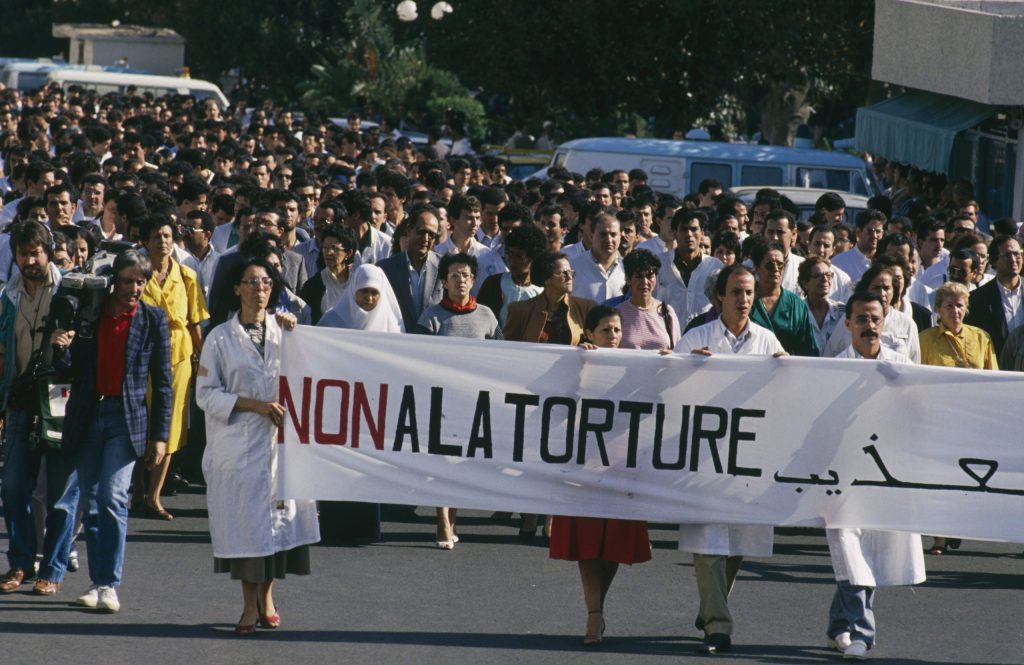One of the most effective tools for ending impunity related to torture is the “Manual on Effective Investigation and Documentation of Torture and Other Cruel, Inhuman or Degrading Treatment or Punishment.” Commonly known as the Istanbul Protocol, this UN document outlines international legal standards and sets out specific guidelines on how to document and conduct effective legal and medical investigations into allegations of torture and ill-treatment. The Istanbul Protocol is the first set of international guidelines for the medical documentation of torture and its consequences.
The creation of the Istanbul Protocol in 1999 was a major victory within the human rights field by empowering doctors to evaluate and testify on behalf of alleged victims of torture. Prior to this, medico-legal evidence showing signs of torture was often dismissed in court or discredited by state forensic doctors. Today, doctors now hold the tools to better articulate physical and psychological signs of torture, and state officials are held to higher ethical standards to accept this information.
The Istanbul Protocol is used across the world by monitoring bodies at the international and national level to survey conditions at detention centers. Governments are required to comply with these investigations and must grant detainees access to medical and legal counsel that can conduct Istanbul Protocol evaluations.
“The Istanbul Protocol has transformed how we understand, investigate, document, and work towards the eradication of torture around the world.”
Vincent Iacopino, MD, PhD, Istanbul Protocol Editorial Committee Member, former Medical Director and current Advisory Council member at Physicians for Human Rights, and Adjunct Professor of Medicine at University of Minnesota Medical School.
The Istanbul Protocol touches nearly all facets of PHR’s work. In Central Asia, PHR trained thousands of medical and forensic experts, defense attorneys, prosecutors, and judges on how to use the Istanbul Protocol, building a robust anti-torture movement within the country. Our advocacy caused the ministries of health in Kyrgyzstan and Tajikistan to officially implement Istanbul Protocol recommendations and led to the conviction of several police officers who tortured minors, the first ever case of criminal punishments under torture statutes. Clinicians in the PHR Asylum Network also use Istanbul Protocol methodology to evaluate asylum seekers’ claims that they are fleeing imminent physical and psychological harm.

A Tool for Future Accountability: The 2022 Update of the Istanbul Protocol
The new edition of the Istanbul Protocol is updated and strengthened with lessons learned from more than 20 years of implementation experience, providing critical guidance to States to ensure they fulfil their treaty obligations to investigate, prosecute, and punish torture under the UN Convention against Torture (UNCAT) and international law. The 2022 edition includes new guidance on how to improve impartiality and transparency among monitoring bodies, promotes civil society participation in anti-torture investigations, and clarifies the legal and ethical responsibilities of clinicians and lawyers working with particularly vulnerable populations. Read more in PHR’s press release.
Watch: Next Steps for the Global Anti-Torture Movement: Istanbul Protocol 2022
In September 2022, PHR convened experts to reflect on the impact of the Istanbul Protocol, and discuss state of the global anti-torture movement.
Watch: Launch of the Istanbul Protocol 2022
This June, 2022 event marked the official launch of the updated Istanbul Protocol, with Michelle Bachelet, UN High Commissioner for Human Rights, together with representatives of the core UN anti-torture mechanisms and other international human rights bodies. The panel featured Vincent Iacopino, MD, PhD, representing Physicians for Human Rights. Read more.
Questions and Answers about the Istanbul Protocol
What is the Istanbul Protocol?
The Istanbul Protocol is the first set of international guidelines for the medical documentation of torture and its consequences.
Forensic medical evaluations conducted in accordance with Istanbul Protocol standards constitute critically important evidence in torture cases. Trained clinicians examine all signs and sequelae of physical and psychological abuse and produce a medico-legal affidavit documenting their conclusions. These affidavits serve as key evidence to prosecute perpetrators of torture, to help victims obtain redress in civil courts, and to substantiate claims of asylum in new countries.
How was the Istanbul Protocol created?
PHR’s Vincent Iacopino, MD, PhD in his role as PHR’s medical director was a lead author and project coordinator of the Istanbul Protocol, which was developed over the course of three years by more than 75 forensic physicians, psychologists, human rights monitors, and lawyers representing 40 organizations and institutions from 15 countries. In 1999, this ground-breaking resource was adopted as the United Nations’ recognized standard.
How has the Istanbul Protocol been used?
Since its official endorsement by OHCHR in 1999, the Istanbul Protocol’s standards have been adopted by international, regional, and national human rights bodies and legal mechanisms and have served as the global standards for investigations into allegations of torture and ill-treatment. The Istanbul Protocol has informed countless medico-legal investigations conducted by both State and non-State actors into torture worldwide. It has served as a guide to clinicians in best practices for their conduct and documentation of medico-legal assessments of individuals alleging torture and/or ill treatment.
The Istanbul Protocol has shaped a broad range of anti-torture activities including advocacy, training and capacity building, policy reform, prevention, and treatment, and rehabilitation of torture survivors.
What is the legal framework of the Istanbul Protocol?
The Istanbul Protocol fits into a broader framework of human rights law, protecting detainees against torture and other abuses from the moment of arrest. Under the Nelson Mandela Rules, prisoners are protected against certain forms of punishment and are enabled to access medical and legal counsel during their detention. In essence, the Mandela Rules enshrine a minimum standard of treatment owed to prisoners as fellow human beings. Building on these protections, the Istanbul Protocol acts as the mechanism for medical personnel to evaluate prisoners for signs of torture and hold perpetrators accountable.
The Méndez Principles also outline guidelines for law enforcement agents to conduct investigations without the use of torture or coercive methods, and to promote transparency. Together with the Istanbul Protocol, the Méndez Principles aim to build a system where clinicians, lawyers, judges, and law enforcement are willing and able to condemn torture.
In extreme cases where there is evidence to believe that a detainee was unlawfully killed or an enforced disappearance occurred, human rights activists can use the Minnesota Principles to investigate suspicious deaths.
How does PHR promote the use of the Istanbul Protocol?
Since 1999, PHR has trained thousands of health professionals around the world using the Istanbul Protocol guidelines and principles. In 2012, working with three partner organizations, we developed an Istanbul Protocol Plan of Action, a set of practical guidelines which have been instrumental in helping a number of countries improve torture investigation and documentation.
Why was the Istanbul Protocol updated in 2022?
The new edition of the Istanbul Protocol is strengthened with lessons learned from 20 years of implementation experience, providing critical guidance to States to ensure they fulfil their treaty obligations to investigate, prosecute, and punish torture under the UN Convention against Torture (UNCAT) and international law.
The update was led by representatives of four civil society organizations; (Physicians for Human Rights, the International Rehabilitation Council for Torture Victims, the Human Rights Foundation of Turkey, and REDRESS); and the four core United Nations anti-torture bodies (the Committee against Torture, the Subcommittee on Prevention of Torture, Special Rapporteur on Torture, and the United Nations Voluntary Fund for Victims of Torture).
“Nearly 40 years after world governments agreed to prohibit torture, these heinous practices continue in more than half of the world’s countries, often with impunity. We now call on all States to fully implement these standards and meet treaty obligations to prevent torture and ill-treatment, hold perpetrators accountable, and afford victims the redress and rehabilitation they are entitled to under international law.”
Vincent Iacopino, MD, PhD, Istanbul Protocol Editorial Committee Member, former Medical Director and current Advisory Council member at Physicians for Human Rights, and Adjunct Professor of Medicine at University of Minnesota Medical School.
Experts Reflect on the Istanbul Protocol and its Global Impact
A World Without Torture: A Discussion with Dr. Vince Iacopino on the Creation and Function of the Istanbul Protocol
Fighting Impunity in U.S. Black Box Sites: A Discussion on Using and Teaching the Istanbul Protocol with Dr. Sondra Crosby
Confronting the Past: A Discussion with Dr. Rusudan Beriashvili on How the Istanbul Protocol Provides the Tools for Society at Large to Identify and Address Past Human Rights Abuses
Additional Resources
Recent PHR Articles and Statements
PHR Press Release: “Anti-Torture Experts Launch Global, Istanbul Protocol, Standards for Investigation and Documentation of Torture” (June 2022)
The Lancet. Istanbul Protocol 2022 empowers health professionals to end torture (June 2022)
Academic Research on the Istanbul Protocol
Journal of Forensic and Legal Medicine: “Istanbul Protocol implementation in Central Asia: Bending the arc of the moral universe” (January 2020)
Grupo Independientes: “ENCUBRIENDO LA TORTURA Grupo Independientes Complicidad de los forenses de la Procuraduría General de la República Análisis de 54 casos” (November 2020)
Torture Journal: “Incommunicado detention and torture in Spain, Part II: Enhanced credibility assessment based on the Istanbul Protocol” (September 2018)
Torture Journal: “Medical examination of detainees in Catalonia, Spain, carried out in the presence of police officers” (June 2020)
Torture Journal: “A comparative study of the use of the Istanbul Protocol amongst civil society organizations in low-income countries” (September 2018)
Journal of Forensic and Legal Medicine: “Implementing Istanbul Protocol standards for forensic evidence of torture in Kyrgyzstan” (February 2015)
International Rehabilitation Council for Torture Victims: “The Istanbul Protocol: A global stakeholder survey on past experiences, current practices and additional norm setting” (2019)
Legal Cases on the Istanbul Protocol
International Criminal Court: “THE PROSECUTOR v. AL HASSAN AG ABDOUL AZIZ AG MOHAMED AG MAHMOUD” (June 2020)
PHR Press Release: “UK Ruling Sets Precedent on the Use of Medical Evidence in Asylum Cases” (March 2019)

